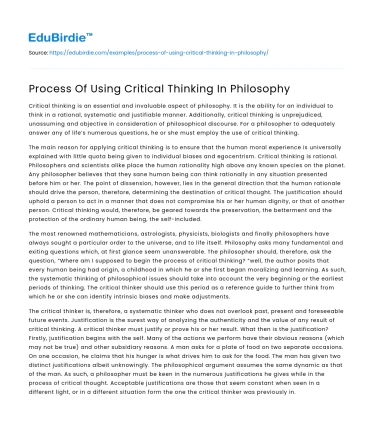Critical thinking is an essential and invaluable aspect of philosophy. It is the ability for an individual to think in a rational, systematic and justifiable manner. Additionally, critical thinking is unprejudiced, unassuming and objective in consideration of philosophical discourse. For a philosopher to adequately answer any of life’s numerous questions, he or she must employ the use of critical thinking.
The main reason for applying critical thinking is to ensure that the human moral experience is universally explained with little quota being given to individual biases and egocentrism. Critical thinking is rational. Philosophers and scientists alike place the human rationality high above any known species on the planet. Any philosopher believes that they sane human being can think rationally in any situation presented before him or her. The point of dissension, however, lies in the general direction that the human rationale should drive the person, therefore, determining the destination of critical thought. The justification should uphold a person to act in a manner that does not compromise his or her human dignity, or that of another person. Critical thinking would, therefore, be geared towards the preservation, the betterment and the protection of the ordinary human being, the self-included.
Save your time!
We can take care of your essay
- Proper editing and formatting
- Free revision, title page, and bibliography
- Flexible prices and money-back guarantee
The most renowned mathematicians, astrologists, physicists, biologists and finally philosophers have always sought a particular order to the universe, and to life itself. Philosophy asks many fundamental and exiting questions which, at first glance seem unanswerable. The philosopher should, therefore, ask the question, “Where am I supposed to begin the process of critical thinking? “well, the author posits that every human being had origin, a childhood in which he or she first began moralizing and learning. As such, the systematic thinking of philosophical issues should take into account the very beginning or the earliest periods of thinking. The critical thinker should use this period as a reference guide to further think from which he or she can identify intrinsic biases and make adjustments.
The critical thinker is, therefore, a systematic thinker who does not overlook past, present and foreseeable future events. Justification is the surest way of analyzing the authenticity and the value of any result of critical thinking. A critical thinker must justify or prove his or her result. What then is the justification? Firstly, justification begins with the self. Many of the actions we perform have their obvious reasons (which may not be true) and other subsidiary reasons. A man asks for a plate of food on two separate occasions. On one occasion, he claims that his hunger is what drives him to ask for the food. The man has given two distinct justifications albeit unknowingly. The philosophical argument assumes the same dynamic as that of the man. As such, a philosopher must be keen in the numerous justifications he gives while in the process of critical thought. Acceptable justifications are those that seem constant when seen in a different light, or in a different situation form the one the critical thinker was previously in. Critical thinking should have little or no recourse to biases. Biased thinking presumably never solves the philosophical questions of the individual, and much less those of others. This assertion proves that human beings share a common moral experience, which is not limited to individual preferences.
Furthermore, critical thinking takes nothing for granted nor does it assume any admission of knowledge of the self and other people. A critical thinker must patiently analyze any claim of truth before incorporating such information in any further philosophical discourse. Jean-Paul Sauter once said that the more subjective an individual is, the more objectively, he sees the world (Sartre, 1947). An objective view should guide subjectivism into the common moral experience shared by all human beings. Paulo Coelho also stated that education should serve to bring a man or woman close to others and not further away from them. Therefore, the subjective critical reason should be conservative, considerate and objective. Critical thinking is a skill that requires keen and careful consideration of many aspects such as individual prejudices. Additionally, critical thinking should be rational, systematic and justifiable. A philosopher should, therefore, train his or her intellect in careful discernment of facts, feelings, and ideas to ensure truthful discourse into philosophical problems.






 Stuck on your essay?
Stuck on your essay?

